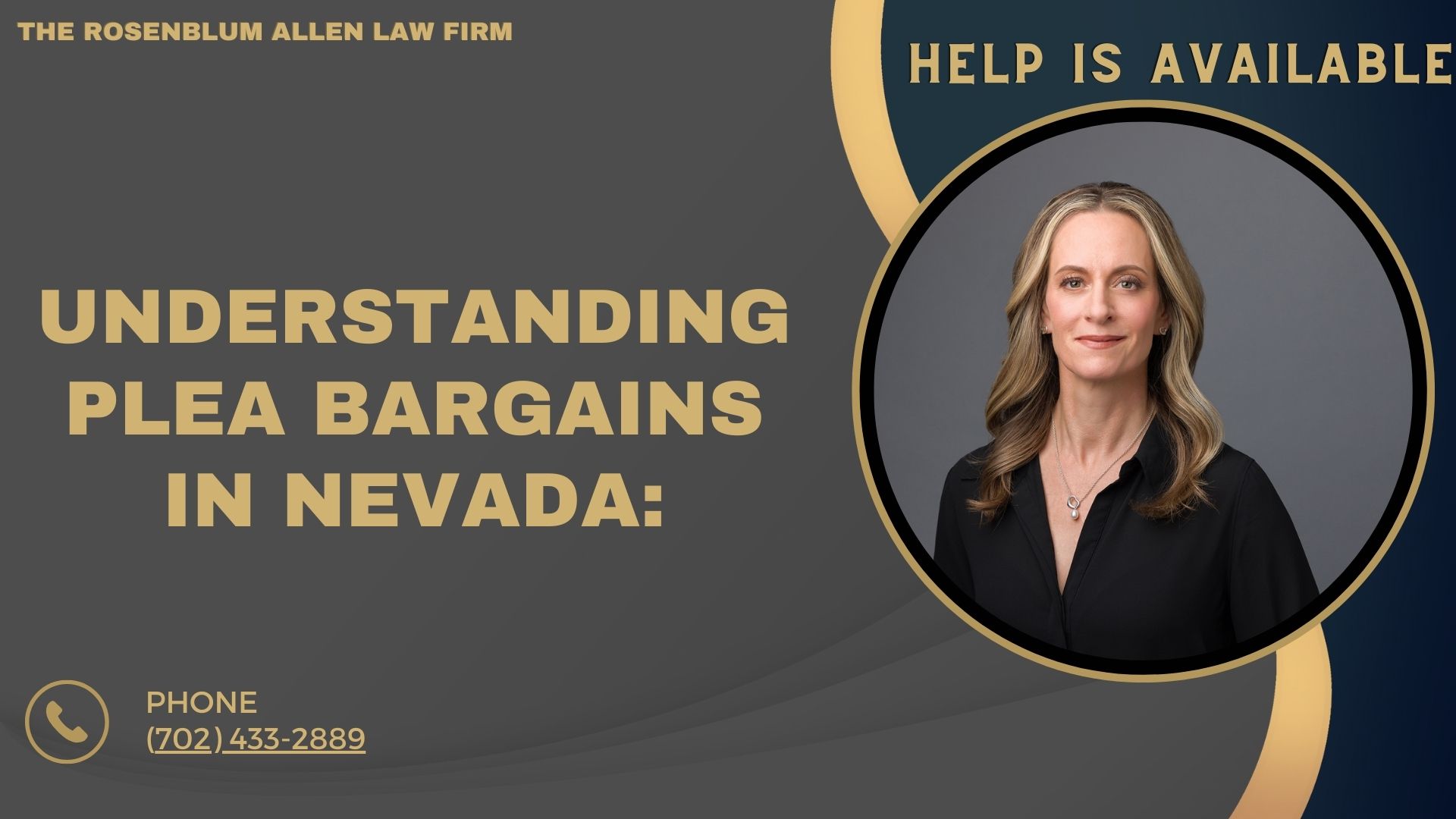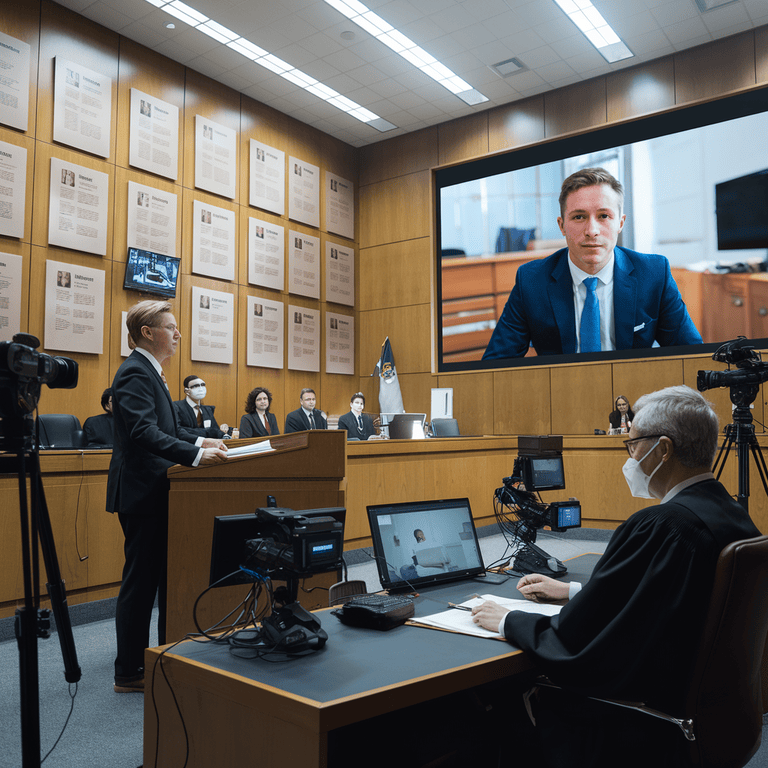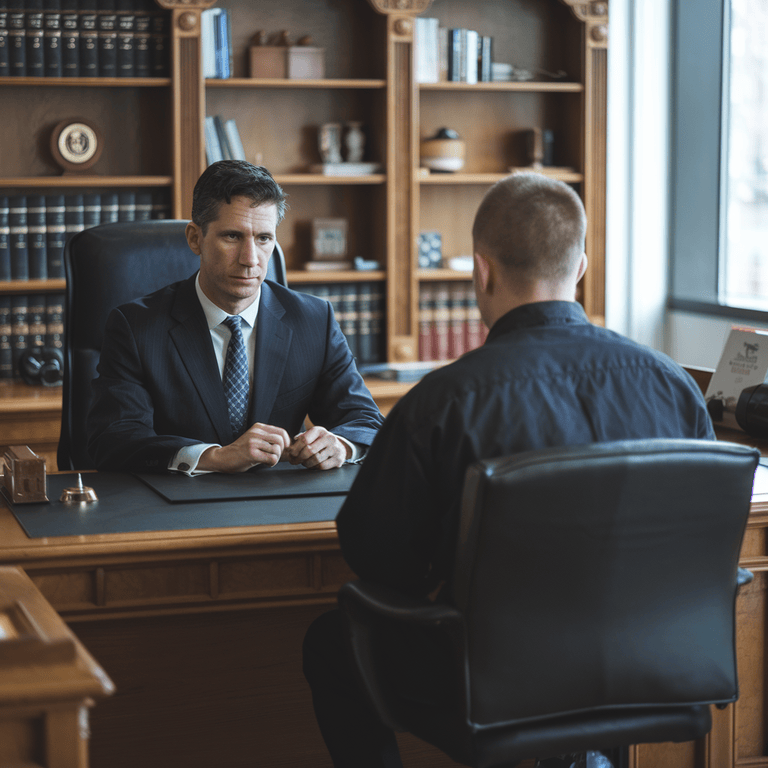If you’re facing criminal charges in Nevada, you may hear the term “plea bargain.” But what does it mean for you? A plea bargain is an agreement between you and the prosecutor to resolve your case without going to trial.
Plea bargains are common in the legal system. They help courts manage caseloads while offering defendants a way to reduce charges or sentencing. But before accepting a deal, you need to understand what’s at stake.
This guide will break down plea bargains in Nevada, explaining how they work, their benefits and risks, and what factors can influence your case.

 What Is a Plea Bargain?
What Is a Plea Bargain?
Definition and Basic Explanation
A plea bargain is a negotiated agreement in which a defendant pleads guilty to a lesser charge or receives a reduced sentence in exchange for avoiding trial. The prosecutor benefits by securing a conviction without the time and uncertainty of a court battle.
Key Elements of a Plea Agreement
- Charge Reduction: The prosecution may drop or lower charges.
- Sentencing Recommendation: The deal may include a lighter penalty.
- Factual Agreement: Both sides may agree on specific case details to streamline the legal process.
- Waiver of Trial Rights: The defendant gives up their right to a jury trial.
How Plea Bargains Differ from Going to Trial
| Aspect | Plea Bargain | Trial |
|---|---|---|
| Time | Faster resolution | Can take months or years |
| Outcome Control | Negotiated agreement | Uncertain verdict |
| Legal Costs | Lower | Higher due to trial expenses |
| Sentence Severity | Often reduced | Potential for maximum penalty |
| Publicity | Less public attention | Can be widely reported |
Plea bargains can be a strategic choice, but they come with trade-offs.
Types of Plea Bargains in Nevada
Not all plea bargains are the same. The type of deal you may be offered depends on your charges and the strength of the prosecution’s case.
Charge Bargaining
This is the most common type of plea deal. You agree to plead guilty to a lesser charge in exchange for having more serious charges dropped.
Example: Instead of facing a felony drug charge, you might plead guilty to a misdemeanor possession charge.
Sentence Bargaining
Here, you plead guilty in exchange for a reduced sentence. The charge remains the same, but the punishment is lighter.
Example: Instead of serving two years in prison, you might receive probation or community service.
Fact Bargaining
In this type, both sides agree on specific facts in the case to limit what evidence can be presented in court. This is less common but can influence sentencing.
Example: The defense and prosecution agree that a weapon wasn’t used, which may prevent an enhanced sentence.
Each type of plea bargain has its own benefits and risks. The right choice depends on your specific case.

How the Plea Bargaining Process Works
Initiating the Negotiation
Plea deals can be initiated by:
- Prosecutors, who may offer a deal to save time and resources.
- Defense attorneys, who negotiate on behalf of their clients.
- Judges, who sometimes encourage plea discussions.
Role of the Prosecutor and Defense Attorney
- Prosecutor’s Role: Determines if a plea offer is appropriate based on evidence and case strength.
- Defense Attorney’s Role: Advises the defendant on whether the offer is fair and negotiates for a better deal if needed.
Court Approval of Plea Agreements
Even if both sides agree, the judge must approve the plea bargain. The judge may:
- Accept the deal as presented.
- Modify the terms (rare but possible).
- Reject the deal if it’s unfair or unjust.
Once approved, the plea is final, and the case moves to sentencing.
Pros and Cons of Accepting a Plea Bargain
A plea bargain can be a smart decision—but it’s not always the right one. Before agreeing to a deal, you should weigh the benefits and risks.
Potential Benefits
- Faster Resolution: Trials can take months or even years. A plea deal speeds up the process.
- Reduced Charges: You may be able to plead to a lesser charge, avoiding harsher penalties.
- Lighter Sentence: Prosecutors often agree to a reduced sentence in exchange for a guilty plea.
- Lower Legal Costs: Trials can be expensive. A plea deal usually means lower attorney fees.
- Less Stress: Courtroom trials can be exhausting. A plea bargain provides certainty and closure.
Possible Drawbacks
- Waiving Your Right to a Trial: Once you accept a plea deal, you lose the chance to fight your case in court.
- Criminal Record Impact: Even a reduced charge can stay on your record and affect your future.
- Possible Coercion: Some defendants feel pressured to accept a deal—even if they didn’t commit the crime.
- Unfavorable Terms: Prosecutors aim to close cases efficiently, but not all plea deals are fair.
Comparing Pros and Cons
| Factor | Benefit | Risk |
|---|---|---|
| Time | Case ends quickly | No chance to present full defense |
| Charges | Possible reduction | Still results in a conviction |
| Sentence | Lighter punishment | No opportunity for a full acquittal |
| Legal Costs | Less expensive | May still require legal fees |
| Public Record | Avoids worst charges | May still have a permanent record |
A plea bargain can be a relief—or a regret. Make sure you fully understand the consequences before agreeing to one.
Factors That Influence Plea Bargain Offers in Nevada
Not all plea deals are the same. The offer you receive depends on several factors, including the strength of the prosecution’s case and your personal history.
Strength of the Prosecution’s Case
- If the evidence against you is overwhelming, the prosecutor may offer a harsher deal.
- If the case is weak, they may agree to a better deal to avoid the risk of losing at trial.
Prior Criminal History
- A first-time offender is more likely to receive a favorable plea deal.
- If you have a history of criminal offenses, the prosecutor may push for a tougher sentence.
Willingness to Cooperate
- If you provide useful information to law enforcement, you may receive a reduced charge.
- Cooperation can include testifying against other defendants or assisting in investigations.
Court and Jail Overcrowding
- If courts are overwhelmed with cases, plea deals may be offered more readily.
- If jails are overcrowded, lighter sentences (such as probation) may be negotiated.
Severity of the Crime
- Minor offenses often receive lenient plea deals.
- Serious crimes, especially violent ones, may come with stricter terms or no plea deal at all.
Prosecutors consider all these factors before making an offer. Your defense attorney can help you understand how these elements affect your case.

Can You Reject a Plea Bargain?
Yes, you have the right to say no to a plea deal. But rejecting a plea comes with risks and rewards.
Defendant’s Right to Refuse
You are never required to accept a plea bargain. If you believe the deal is unfair, you can decline it and proceed to trial.
What Happens If You Reject the Deal?
- Your Case Goes to Trial: The prosecution will present evidence, and a judge or jury will determine your fate.
- You Risk a Harsher Sentence: If convicted, you could face the maximum penalty for your charges.
- You Might Be Acquitted: If your defense is strong, you could win your case and walk free.
Moving Forward with Trial as an Alternative
| Option | Pros | Cons |
|---|---|---|
| Accept the Plea Deal | Certainty, reduced sentence | Criminal record, no trial |
| Reject the Plea & Go to Trial | Chance of acquittal, fight for justice | Risk of harsher punishment, higher costs |
The decision to accept or reject a plea deal is crucial. Consulting with an experienced attorney can help you make the right choice.
Final Considerations Before Accepting a Plea Bargain
Before you agree to a deal, take a step back and consider all your options.
Consulting with a Defense Attorney
- A lawyer can assess whether the plea deal is fair.
- They can negotiate better terms on your behalf.
- They can help you understand the long-term consequences.
Understanding the Long-Term Consequences
- Will this conviction impact your ability to get a job?
- Could it affect housing, education, or immigration status?
- Will it stay on your record permanently?
Ensuring the Agreement Is in Your Best Interest
- Are you accepting the deal because it’s the best choice, or because you feel pressured?
- Have you explored all possible defenses before making your decision?
- Do you fully understand what you’re agreeing to?
A plea bargain is a big decision. Make sure it’s the right one for you.

Breaking It All Down
Plea bargains can help resolve criminal cases quickly, but they come with serious consequences. Before accepting a deal, you should:
- Understand the type of plea bargain being offered.
- Weigh the pros and cons carefully.
- Consider the factors that influence the offer.
- Know your right to refuse and go to trial.
- Consult with an experienced attorney.
Making an informed decision can protect your future. If you’re facing a criminal charge in Nevada, don’t navigate the legal system alone—get professional legal advice before signing any plea agreement.

Frequently Asked Questions
Can a judge change the terms of a plea bargain?
In most cases, judges approve plea bargains as they are presented. However, a judge has the authority to reject or modify a plea agreement if they believe it is unfair or not in the interest of justice.
Is a plea bargain the same as pleading guilty?
Not exactly. A plea bargain involves negotiation between the prosecution and the defense, resulting in a specific agreement. Pleading guilty without a plea deal means accepting all original charges and potential penalties without any concessions.
Do I have to admit guilt to accept a plea bargain?
Most plea deals require you to admit guilt. However, in some cases, a defendant may enter an Alford plea, which means they do not admit guilt but acknowledge that the prosecution has enough evidence to convict them.
Can a plea bargain be withdrawn after it is accepted?
Once a judge formally accepts a plea bargain, it is generally binding. However, under special circumstances—such as evidence of coercion, ineffective legal counsel, or newly discovered evidence—a defendant may be able to withdraw their plea before sentencing.
Do plea bargains apply to all types of crimes?
Plea bargains are common in many cases, including misdemeanors and non-violent felonies. However, for serious offenses such as violent felonies or high-profile crimes, prosecutors may be less likely to offer a deal.
Will a plea bargain remove a conviction from my record?
No, accepting a plea deal still results in a conviction. However, if you plead guilty to a lesser charge, you may have more options for record sealing or expungement in the future.
Can I negotiate a better plea deal?
Yes, plea deals are negotiable. Your defense attorney can work to secure better terms, such as a lighter sentence, reduced charges, or alternative sentencing options like probation instead of jail time.
What happens if I take a plea deal and violate probation?
If your plea bargain includes probation and you violate its terms, the court may revoke your probation and impose the original or maximum sentence allowed for your charge.
Are plea bargains public record?
Yes, unless sealed by the court, plea agreements are part of the public record and can be accessed like other court documents.
Do plea bargains affect civil cases?
Yes, a guilty plea in a criminal case can be used as evidence in related civil lawsuits. For example, if you plead guilty to DUI, it could be used against you in a civil suit for damages.
Should I accept a plea bargain if I am innocent?
This is a difficult decision. While some defendants accept plea deals to avoid the risk of harsher punishment at trial, pleading guilty means having a conviction on your record. Consulting an experienced defense attorney is critical before making such a decision.

Additional Resources for You from The Rosenblum Allen Law Firm.
- Criminal Defense Attorney – Skilled representation for all criminal charges in Nevada, ensuring a strong defense strategy.
- Las Vegas DUI Lawyer – Defending against DUI charges to protect your driving privileges and minimize penalties.
- Domestic Violence Lawyer Las Vegas – Legal assistance for those accused of domestic violence, ensuring a fair defense.
- Drug Possession Lawyer – Protecting your rights against drug-related charges, from simple possession to trafficking.
- Sex Crimes Attorney – Providing a strong defense for individuals accused of sex-related offenses.
- CPS Defense Attorney – Defending parents and guardians against child abuse and neglect accusations.
- Misdemeanor Lawyer – Representation for misdemeanor offenses, minimizing consequences and penalties.
- Las Vegas Warrant Defense Attorney – Assistance with outstanding warrants to avoid arrests and legal complications.
- Las Vegas Probation Violation Attorney – Protecting your freedom if accused of violating probation terms.
- Theft Crime Defense Lawyer – Defending against theft, burglary, and robbery charges.
- Kidnapping Lawyers – Experienced defense for kidnapping and related charges.
- Juvenile Defense Lawyers – Protecting the rights and future of juveniles facing criminal charges.
- Firearms Lawyer Las Vegas – Legal defense for firearm-related charges, from unlawful possession to illegal sales.

Offsite Resources for You
American Bar Association (ABA) – A trusted source for legal education, criminal defense resources, and guidance on plea bargains.
FindLaw – Offers legal information on plea bargains, criminal law, and what to expect in the court system.
Justia – A comprehensive legal resource with information on criminal defense, plea negotiations, and case law.
National Association of Criminal Defense Lawyers (NACDL) – Provides advocacy and education on criminal defense strategies, including plea bargains.
Avvo – Connects individuals with attorneys and provides legal advice on plea deals and criminal charges.
NOLO – A great resource for understanding legal rights, including plea bargaining and defense options.
Innocence Project – Focuses on wrongful convictions and helps defendants understand their rights in the legal system.

A Special Message from Our Lead Attorney, Molly Rosenblum Allen, Esq

Thank you for taking the time to explore these resources. I know that navigating the legal system can be overwhelming, but you don’t have to face it alone. My team and I are here to provide the guidance and support you need.
If you’re ready to take the next step, give us a call at (702) 433-2889. Let’s discuss your situation and start working toward the best possible outcome for you.
I look forward to helping you.
— Molly Rosenblum Allen, Esq




